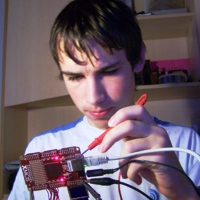We recently filmed an introduction to XC training video which walks the viewer through some of the main concepts of XC that may be new to embedded C programmers - input/output (ports and channels), par, timers and select etc.
What would you like to see next from these videos? Is there an area of XC you'd like more coaching on?
Here are some areas we have thought of that might be interesting - cast your vote or leave a comment if there is something else you'd like to see!
XC training video - what next?
-
infiniteimprobability

- XCore Legend
- Posts: 1126
- Joined: Thu May 27, 2010 10:08 am
-
infiniteimprobability

- XCore Legend
- Posts: 1126
- Joined: Thu May 27, 2010 10:08 am
By the way - you need to be logged in to cast your vote!
-
Berni

- Respected Member
- Posts: 363
- Joined: Thu Dec 10, 2009 10:17 pm
Id really like to know more about channels as the documentation on that is a bit lacking. Like what kinds of channels to use where and some numbers on how fast they actually are in certain situations.
-
f_petrini

- Active Member
- Posts: 43
- Joined: Fri Dec 11, 2009 8:20 am
I agree with Berni.
I'd like to see an in-depth video about channels since they are such an important part of concurrent programming.
I'd like to see an in-depth video about channels since they are such an important part of concurrent programming.
-
JohnR
- Experienced Member
- Posts: 93
- Joined: Fri Dec 11, 2009 1:39 pm
I am not sure that videos are the best way to show this type of information. They work well demonstrating features of, say, a GUI but I would prefer to see written documentation that I could refer to as needed. The Wiki would be a good place for this material.I'd like to see an in-depth video about channels since they are such an important part of concurrent programming.
For instance, from page 34 of Programming XC on XMOS Devices,
Code: Select all
A streaming channel establishes a permanent route between two threads over which
data can be efficiently communicated without synchronisation.On a slightly different but related topic, it would be great if XMOS bug work-arounds (or just plain bugs) were always posted to the Wiki.
John.
-
Berni

- Respected Member
- Posts: 363
- Joined: Thu Dec 10, 2009 10:17 pm
Yes id prefer it written and as in depth as it reasonably goes. The statement you quoted is not helpful to me aether as it doesn't tell you what syncopation actually is and what behavior it causes.
Also I/O is the other specialty found on xmos so i think that should have some extra detailed info on it too. meaby also show various ways of doing a specific I/O task like UART, SPI, I2S... Also give you some real numbers how fast and such each implementation is (Bitbang,timers,bufferd or clocked ports...)
Don't think there is much point in explaining the GUI that much as its mostly self explanatory. It just might be useful to show a little how to practical use some tools like the VCD trace and timing analyzer.
Also I/O is the other specialty found on xmos so i think that should have some extra detailed info on it too. meaby also show various ways of doing a specific I/O task like UART, SPI, I2S... Also give you some real numbers how fast and such each implementation is (Bitbang,timers,bufferd or clocked ports...)
Don't think there is much point in explaining the GUI that much as its mostly self explanatory. It just might be useful to show a little how to practical use some tools like the VCD trace and timing analyzer.
-
daveg

- Member++
- Posts: 28
- Joined: Thu Dec 10, 2009 7:25 pm
Isn't that what the KnowledgeBase on xmos.com is for? (at least until an update makes a work-around unnecessary)On a slightly different but related topic, it would be great if XMOS bug work-arounds (or just plain bugs) were always posted to the Wiki.
-
infiniteimprobability

- XCore Legend
- Posts: 1126
- Joined: Thu May 27, 2010 10:08 am
OK, well it looks like we have a clear winner emerging then:
- Advanced channel usage and optimisations 41%
- Debugging techniques for XMOS 18%
- Sharing data between threads 12%
- Mixing C and XC 6%
- Mixing ASM and XC 6%
- Programming flash at runtime - introduction to libflash 6%
- Using your own IDE/Editor with the command line tools 6%
- Interfacing to external clock domains 6%
Thanks to everyone who voted. We'll get working on it so watch this space....
- Advanced channel usage and optimisations 41%
- Debugging techniques for XMOS 18%
- Sharing data between threads 12%
- Mixing C and XC 6%
- Mixing ASM and XC 6%
- Programming flash at runtime - introduction to libflash 6%
- Using your own IDE/Editor with the command line tools 6%
- Interfacing to external clock domains 6%
Thanks to everyone who voted. We'll get working on it so watch this space....
